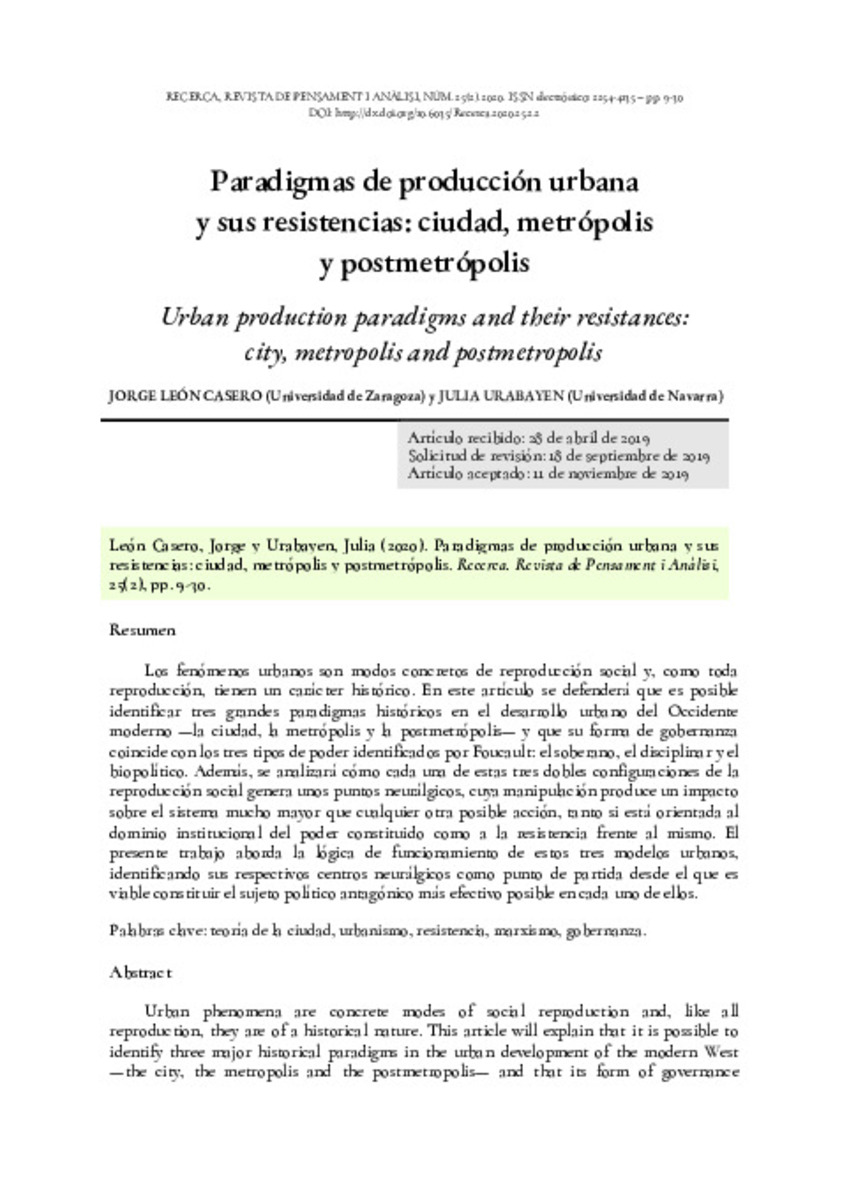Full metadata record
| DC Field | Value | Language |
|---|---|---|
| dc.creator | León-Casero, J. (Jorge) | - |
| dc.creator | Urabayen, J. (Julia) | - |
| dc.date.accessioned | 2023-05-15T10:34:38Z | - |
| dc.date.available | 2023-05-15T10:34:38Z | - |
| dc.date.issued | 2020 | - |
| dc.identifier.citation | León-Casero, J. (Jorge); Urabayen, J. (Julia). "Paradigmas de producción urbana y sus resistencias: ciudad, metrópolis y postmetrópolis". Recerca-revista de pensament & analisi. 25 (2), 2020, 9 - 30 | es |
| dc.identifier.issn | 1130-6149 | - |
| dc.identifier.uri | https://hdl.handle.net/10171/66231 | - |
| dc.description.abstract | Los fenómenos urbanos son modos concretos de reproducción social y, como toda reproducción, tienen un carácter histórico. En este artículo se defenderá que es posible identificar tres grandes paradigmas históricos en el desarrollo urbano del Occidente moderno —la ciudad, la metrópolis y la postmetrópolis— y que su forma de gobernanza coincide con los tres tipos de poder identificados por Foucault: el soberano, el disciplinar y el biopolítico. Además, se analizará cómo cada una de estas tres dobles configuraciones de la reproducción social genera unos puntos neurálgicos, cuya manipulación produce un impacto sobre el sistema mucho mayor que cualquier otra posible acción, tanto si está orientada al dominio institucional del poder constituido como a la resistencia frente al mismo. El presente trabajo aborda la lógica de funcionamiento de estos tres modelos urbanos, identificando sus respectivos centros neurálgicos como punto de partida desde el que es viable constituir el sujeto político antagónico más efectivo posible en cada uno de ellos. | es_ES |
| dc.description.abstract | Urban phenomena are concrete modes of social reproduction and, like all reproduction, they are of a historical nature. This article will explain that it is possible to identify three major historical paradigms in the urban development of the modern West —the city, the metropolis and the postmetropolis— and that its form of governance coincides with the three types of power identified by Foucault: sovereign, disciplinary and biopolitical. In addition, it will analyze how each of these three double configurations of social reproduction generate neuralgic points, whose manipulation produces an impact on the system much greater than any other possible action, whether oriented towards the institutional domain of constituted power or to the resistance against it. The present work addresses the logic of these three urban models, identifying their respective neuralgic centers as a starting point from which it is viable to constitute the most effective antagonistic political subject in each of them. | es_ES |
| dc.language.iso | eng | es_ES |
| dc.publisher | Equipo Recerca | es_ES |
| dc.rights | info:eu-repo/semantics/openAccess | es_ES |
| dc.subject | Teoría de la ciudad | es_ES |
| dc.subject | Urbanismo | es_ES |
| dc.subject | Resistencia | es_ES |
| dc.subject | Marxismo | es_ES |
| dc.subject | Gobernanza | es_ES |
| dc.subject | Theory of the city | es_ES |
| dc.subject | Urbanism | es_ES |
| dc.subject | Resistance | es_ES |
| dc.subject | Marxism | es_ES |
| dc.subject | Governance | es_ES |
| dc.title | Paradigmas de producción urbana y sus resistencias: ciudad, metrópolis y postmetrópolis | es_ES |
| dc.title.alternative | Urban production paradigms and their resistances: city, metropolis and postmetropolis | es_ES |
| dc.type | info:eu-repo/semantics/article | es_ES |
| dc.description.note | cc-by-sa | es_ES |
| dc.identifier.doi | 1130-6149 | - |
| dadun.citation.endingPage | 30 | es_ES |
| dadun.citation.number | 2 | es_ES |
| dadun.citation.publicationName | Recerca-revista de pensament & analisi | es_ES |
| dadun.citation.startingPage | 9 | es_ES |
| dadun.citation.volume | 25 | es_ES |
Files in This Item:
Statistics and impact
Items in Dadun are protected by copyright, with all rights reserved, unless otherwise indicated.






